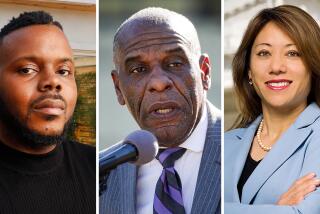Endorsement: These five candidates will make great Los Angeles County Superior Court judges

- Share via
The 10 races for Los Angeles Superior Court judge produced five winners in the March primary, and five contests in which no candidate won an outright majority. In the Nov. 5 runoffs, The Times recommends as follows:
Office No. 39: Steve Napolitano
Steve Napolitano stands apart from most judicial candidates because of the diversity of his experience. He represents prisoners at their parole hearings, which means he is in a sense a public defender for Californians serving their sentences. He also is an administrative law judge, hearing civil cases alleging violations of city or county codes. He had his own practice dealing with contract matters.
That’s all on top of a long career in government, including on the Manhattan Beach City Council, where he led the city’s efforts to atone for its role in shutting Black property owners out of Bruce’s Beach many decades earlier. He was chief of staff for Los Angeles County Supervisor Don Knabe, and simultaneously had a private law practice (with county permission).
From the top of the ticket to local ballot measures, California voters this year are grappling with major decisions that will shape their lives and communities for years to come.
Varied backgrounds like Napolitano’s are valuable assets. Attorneys who spend their entire careers as prosecutors or criminal defense lawyers typically become very good at what they do but don’t always make the best judges. Having viewed the justice system from a single window, they may have trouble making the transition to the bench, where a wider and more balanced perspective is needed.
George A. Turner Jr. is an accomplished and well-regarded deputy public defender who probably would make a capable judge. But like most judicial candidates, he’s mostly a one-window attorney. Voters can’t go wrong in this race, but their best choice for this Superior Court seat is Napolitano.
Office No. 48: Ericka J. Wiley
Ericka J. Wiley has spent most of her career in criminal defense, but has varied experiences that give her a broader perspective. Before practicing law she worked at a maternity home, taking teenage mothers to their appearances in dependency and delinquency court. Amid a hiring freeze in Los Angeles County, she took a job as a deputy public defender in largely rural Merced County. Returning to L.A., she defended clients accused of capital and sex cases. Recognized for her expertise, she was promoted to an administrative position, supervising attorneys in the Superior Court’s Bellflower courthouse. But she preferred trials and is now back in the courtroom. She says that she has taken a nontraditional track in life, such as becoming a mother at age 49.
In addition to a precarious presidential election and high-stakes U.S House races, California voters in November will also weigh in on a slew of statewide ballot measures that could significantly shape policy.
For the record:
12:00 p.m. Oct. 16, 2024A previous version of this endorsement said there were three candidates on the Defenders of Justice slate. There are only two.
Wiley is one of two candidates backed by the Defenders of Justice, a slate led by social justice organization La Defensa. Critics charge that the slate has a political agenda that conflicts with fact-based, evenhanded justice. Whether or not that is the case, each of its candidates deserves to be evaluated based on their ability, experience and integrity. It’s a test that Wiley passes easily; she’s a standout candidate and if elected would probably be an excellent judge.
Her opponent, Renee Rose, also has practiced law in two counties (Riverside and Los Angeles), although as a prosecutor. She also is qualified to be a judge, but voters can pick only one. Wiley is the better choice.
Office No. 97: Sharon Ransom
Sharon Ransom brings exactly the qualities that voters should seek out in judges: She has a breadth of personal and professional experience, and combines expertise in the law with a willingness to exercise discretion not merely to hold offenders accountable but to solve underlying problems, including addiction, mental illness and poverty.
Ransom worked for 17 years as a dispatcher for the Los Angeles County Sheriff’s Department while raising a child as a single mother. She was almost 40 by the time she began an entirely new career as a criminal prosecutor. In her 18 years as a deputy district attorney, she has worked in some of the office’s most challenging assignments, including major narcotics and elder abuse cases. She currently works in the mental health unit, where defendants are dealing with psychiatric illnesses and often homelessness. She has handled dozens of jury trials, displaying what others working alongside her have described as a calm and professional demeanor.
Her opponent, former Deputy Public Defender La Shae Henderson, likewise argues for a balanced approach to criminal justice. But it’s Ransom who is most likely to deliver and is the better choice.
The presidential race between Democratic Vice President Kamala Harris and Republican former President Trump is at the top of the ticket tonight. Follow our live coverage.
Office No. 135: Steven Yee Mac
Steven Yee Mac is a deputy district attorney, a title that belies his varied and impressive legal background. After serving as an intelligence officer in the Army, he joined the Judge Advocate General Corps, defending soldiers accused of misconduct and exploring the role of drugs and trauma in their alleged offenses. He also practiced contract law. He interviewed for the Los Angeles County district attorney’s office by Zoom while deployed in Afghanistan.
As a prosecutor, his assignment focuses on murder, extortion and other crimes committed in the area around MacArthur Park. Victims consist largely of immigrant families, much like his own.
He’s a well-regarded trial attorney with the skill, demeanor and maturity to make an outstanding judge.
Georgia Huerta is also an experienced and well-regarded deputy district attorney. This is another of those races in which voters can’t go wrong. But Mac has the advantage in breadth of experience.
Office No. 137: Tracey M. Blount
Tracey M. Blount represents Los Angeles County in dependency court, where judges decide whether to remove children from their homes because of abuse or neglect. She previously worked as a paralegal, then as an appellate attorney in the San Bernardino County district attorney’s office.
Blount is highly regarded for her skill and calm demeanor. That’s particularly important in dependency court, where emotions can run high and the dynamic shifts in the course of proceedings from quasi-prosecutorial — as lawyers make their cases against parents — to collaborative, as the parties attempt to create a plan to reunify the family while keeping the children safe.
Her opponent is Luz E. Herrera, whose varied legal career has taken her from a small practice in Compton to leading clinical programs at law schools in Southern California and at Texas A&M. She might well make a good judge, but between the two it is Blount who is best qualified.
More to Read
A cure for the common opinion
Get thought-provoking perspectives with our weekly newsletter.
You may occasionally receive promotional content from the Los Angeles Times.













